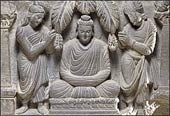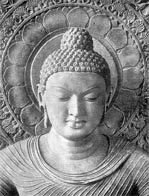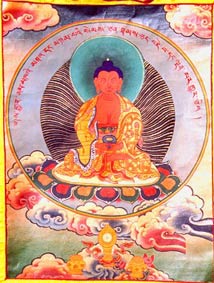A Boat to the Other Shore....
Where is God in Buddhism? Why is Buddhism considered a religion? Where is the spirituality in Buddhism? One approach to answering such questions is to look at how spiritual
progress occurs, and under what conditions it occurs.
A beautiful, poetic look at the path to God-realization is found in the lines of the 13th century Persian poet Mahmud Shabistari: Go sweep out the chamber of your heart, Mystic Rose Garden, Mahmud Shabistari, translated by E.H. Whinfield From this perspective, the challenge of life is discovering how to be ready, how to be swept out, how to become a hollow reed, an empty cup that is ready to be filled. Wali Ali Meyer of the Sufi Ruhaniat describes that process of "making ready" in these terms: “As Hazrat Inayat Khan says in no uncertain terms in The Inner Life, a person needs to be whole to take the journey. The point of this is to get your basic self in tune with your higher self. We are talking here about wounded psyches, fractured consciousness and dysfunction. Without addressing these issues, a person can become quite advanced in many ways, and yet at a certain point find it necessary to self-destruct because she/he has not made a true accommodation in her/himself to sustain realization. Many of us started on the path even sneering at the psychological aspect of things, but had to go back to do such things as address our inner child, align the three selves, do a 12 step program, or some form of individual or group therapy.”
Wali
Ali Meyer, Sufi Ruhaniat Mureed’s Manual, 2005, p77
The idea of preparation is beautifully expressed in the book Gāyatrī by I.K Taimni as: "... the necessity of character building is not generally appreciated in sufficient degree... [which] results generally in failure, frustration and a consequent loss of faith... It is only when the aspirant has developed the requisite traits of character and a dynamic urge to find the Truth that he can steadily tread the path... It is only when the ground has been well prepared by self-discipline and upāsana [worship, recitation, service, lit. "sitting near"] that the aspirant can successfully take up the practice... Before any spiritual light from the innermost recesses of our being can break through into the realms of our mind, much has to be accomplished. Impurities have to be removed, distortions have to be straightened out, the vehicles have to be harmonized. It is only in such a prepared mind, freed from these ordinary defects, that the light of higher knowledge can manifest. But when this light of knowledge does appear, the sadhaka [worshiper] has lit his own lamp and in the light shed by this lamp can tread steadily the path which leads ultimately to Self Realization. But the preparatory work must be done before this spiritual light can appear... " Gāyatrī, I.K. Taimni, The Theosophical Publishing House, Adyar, Preface and pp29-30 The Buddha, over 2000 years ago, clearly saw that in order to make spiritual progress, one must undergo a certain degree of preparation. For example, without learning the discipline of freedom from suffering, one cannot discover and reside in that place where the still, quiet voice within can be perceived. Indeed, the Buddha saw that many of the people of his time were still battling each other, despite all of their magnificent religious traditions such as the great truths of the Upanishads. Living a spiritual life, the Buddha saw, is not about arguing over the name of that which is beyond name and form, but rather is about living in harmony with the Divine Presence in every moment of life. We must undergo preparation in order to be aware of the Divine Presence which is the light of our life. The Divine seeds of enlightenment are continually being showered upon us, and it is our task to make the ground ready so that the seeds may bloom into their fullness. Jesus told his disciples much the same when he said: And he spake many things unto them in parables, saying, Behold, a sower went forth to sow; And when he sowed, some seeds fell by the way side, and the fowls came and devoured them up: Some fell upon stony places, where they had not much earth: and forthwith they sprung up, because they had no deepness of earth: And when the sun was up, they were scorched; and because they had no root, they withered away. And some fell among thorns; and the thorns sprung up, and choked them: But other fell into good ground, and brought forth fruit, some an hundredfold, some sixtyfold, some thirtyfold. Who hath ears to hear, let him hear. Gospel of Matthew 13:3-9 In the introduction to his wonderful translation of The Dhammapada, Eknath Easwaran describes the following discussion which Buddha had with his disciples which points toward the essence of spiritual preparation: The Buddha’s penetrating insight attracted many intellectuals,
one of whom, Malunkyaputra, grew more and more frustrated as
the Buddha failed to settle certain basic metaphysical questions.
Finally he went to the Buddha in exasperation and confronted
him with the following list: “Blessed One, there are theories which you have left unexplained and set aside unanswered: whether the world is eternal or not eternal; whether it is finite or infinite; whether the soul and the body are the same or different; whether a person who has attained nirvana exists after death or does not; or whether perhaps he both exists and does not exist, or neither exists nor does not. The fact that the Blessed One has not explained these matters neither pleases me nor suits me, I will give up spiritual disciplines and return to the life of a layman.” “Malunkyaputra,” the Buddha replied gently, “when you took to the spiritual life, did I ever promise you I would answer these questions?” Malunkyaputra was probably already sorry for his outburst, but it was too late. “No Blessed One, you never did.” “Why do you think that is?” “Blessed One, I haven’t the slightest idea!” “Suppose, Malunkyaputra, that a man has been wounded by a poisoned arrow, and his friends and family are about to call a doctor. ‘Wait!’ he says. I will not let this arrow be removed until I have learned the caste of the man who shot me. I have to know how tall he is, what family he comes from, where they live, what kind of wood his bow is made from, what fletcher made his arrows. When I know these things, you can proceed to take the arrow out and give an antidote for the poison.’ What would you think of such a man?” “He would be a fool, Blessed One,” replied Malunkyaputra shamefacedly. “His questions have nothing to do with getting the arrow out, and he would die before they were answered.” “Similarly, Malunkyaputra, I do not teach whether the world is eternal or not eternal; whether it is finite or infinite, whether the soul and the body are the same or different, whether a person who has attained nirvana exists after death or does not, or whether perhaps he both exists and does not exist, or neither exists nor does not. I teach how to remove the arrow: the truth of suffering, its origin, its end, and the noble eightfold path.” The Dhammapada, Eknath Easwaran, Nilgiri Press, pg 39ff Having grown up in the midst of the Hindu tradition, Buddha saw that even with the common concept of One Creator as described in the Vedas, the people remained divided due to the various interpretations and descriptions of That Which can neither be interpreted nor described. Transcendental knowledge which dissolves the apparent differences and distinctions of this world cannot be given by a teacher, it must simply be experienced. Yet, this experience requires preparation. Just as seeds will be more likely to grow to their fullest expression if the soil is properly prepared and carefully tended, so it is that the Light Within will reach its fullest expression when the individual is properly prepared and has acquired the skills to reach the other shore. And so, in the introduction to The Dhammapada, Eknath Easwaran continues with this insightful story: “Perhaps,” a disciple suggested discreetly on another occasion, “these are matters which the Blessed One himself has not cared to know.” The Buddha did not answer, but smiled and took a handful of leaves from the branch of a tree under which they sat. “What do you think,” he asked, “are there more leaves in my hand or on this tree?” “Blessed One you know your handful is only a small part of what remains on the branches. Who can count the leaves of a shimshapa tree?” “What I know,” the Buddha said, “is like the leaves of that tree; what I teach is only a small part. But what I offer, I offer to all with an open hand. What do I not teach? Whatever is fascinating to discuss, divides people against each other, but has no bearing on putting an end to sorrow. What do I teach? Only what is necessary to take you to the other shore.” The Dhammapada, Eknath Easwaran, Nilgiri Press, pg 41 The words may be different, but beyond the mere words there is the meaning of the words. The boat that takes one to the "other shore" is the very same thing as the broom that sweeps out the chamber of the heart... they are the preparation which is necessary in order for one to be capable of expressing the Divine Presence, and helping one become an expression of the Divine Presence is the only goal of a true spiritual teacher. Indeed, as we look into the depths of religious teachings, the essential unity of all religions gradually begins to appear beyond the veils of our own preferences and opinions. The discovery of the Divine, that which is beyond the the little self, is something that can only be experienced, not taught, yet it requires suitable preparation. Certainly Buddha used different techniques than other great teachers such as Moses, Jesus or Muhammad, but all of these different preparations will, in their own unique way, lead to a life filled with love, harmony and beauty. Call it Buddha-nature, call it Divine Presence, call it what you will... this glorious purity of heart is the inner light within every person, and it is within the reach of every person. The enlightened essence, the divine essence, already exists within every person, awaiting discovery, awaiting its opportunity to shine forth into the world. Yet we chase about after money and possessions, looking hither and yon, while all the time the perfect peace and the greatest of wonders is already here within us, quietly awaiting discovery. The goal of a true spiritual teacher is merely to be a boat to the other shore, to help sweep clean the path, to help us become ready for our own personal experience. And in this manner, the teachings of Buddha are, in their own style, striving toward the same Divine goal as the teachings of all of the great religions... to prepare us to rise above the pettiness of the little self so that we may experience, acknowledge and manifest Divine Qualities such as Kindness, Compassion, Forgiveness and Beneficence in every moment of life.
Wishing you love, harmony and beauty,
posted June 23, 2002 |



 This
same idea, the idea that we must prepare ourselves to be capable
of manifesting the Divine Presence, is the very foundation of all
religions including Buddhism. That is, in order to truly make significant
spiritual progress we must be "clear", we must be empty of the little
self. Many people are fighting for freedom, but all too often our
battles are fought outside, when the greatest battle is the personal
conquest which must happen within.
This
same idea, the idea that we must prepare ourselves to be capable
of manifesting the Divine Presence, is the very foundation of all
religions including Buddhism. That is, in order to truly make significant
spiritual progress we must be "clear", we must be empty of the little
self. Many people are fighting for freedom, but all too often our
battles are fought outside, when the greatest battle is the personal
conquest which must happen within.